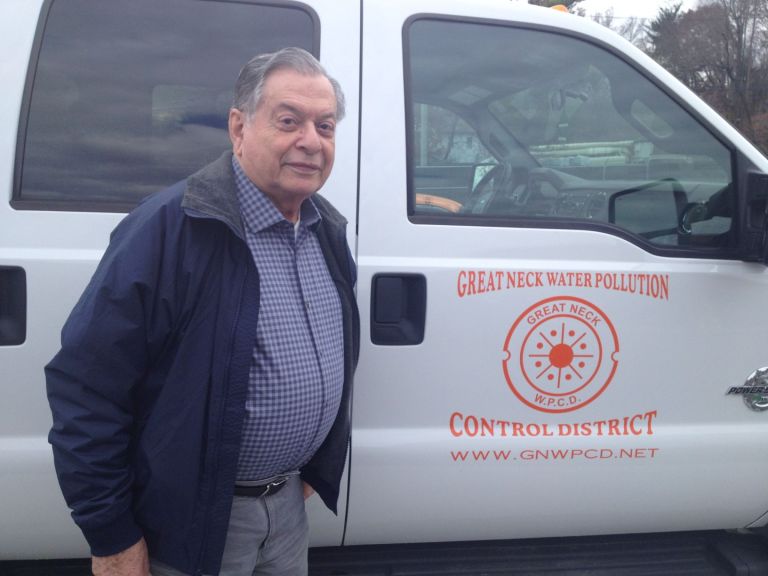
Even though he had a successful eyeglass manufacturing business, what Jerry Landsberg wanted to do was serve on the Great Neck Water Pollution Control District.
“I wanted to be a sewer commissioner for years,” Landsberg said. “There’s not a specific reason, I guess maybe originally I just thought it was a cute idea.”
Landsberg is running unopposed in this year’s commissioners election. He has been serving for the past seven years, and hopes to serve another three-years term.
Landsberg, who has lived in Great Neck for 51 years, has also served as a Village of Kensington trustee in the late 1960s and early 1970s.
He was later appointed to the water pollution control district predecessor resigned early. He later won his seats on the board election.
Fellow Commissioner Steve Reiter said that Landsberg helps the district run with the efficiency of a private enterprise.
“What Jerry brought to the table was his business experience,” Reiter said. “It’s the manner in which he looks at this like a business.”
Of all the things that Landsberg is looking forward to in the district, the grease receiving station is No. 1.
Landsberg said all restaurants are required to get rid of the grease from their grease traps, and that the two closest places to dispose of them outside of the Great Neck Water Pollution Control District are located in Suffolk County and in New Jersey.
By having an on-site facility at the district’s plant, located at 236 E. Shore Road, the water pollution control district will not only cut down on the transportation costs for the drivers who haul the grease, but also allow for the plant to use some of the energy that will come from converting the grease.
The grease that the plant will receive will burn off methane, which the plant will use to generate power to the micro turbines that power the facility, which treats sewage for the villages of Great Neck, Great Neck Plaza, Kensington, Thomaston, Saddle Rock and parts of Manhasset.
Landsberg said the district is currently applying for grants to fund the project, but that most of it will be paid for by a bond.
The treated grease would give off methane gas, Murphy said, that will be used
“We won’t have to raise taxes,” Landsberg said. “In fact we’ll be saving tax money.”
Reiter said that the plant is always looking to be ecologically efficient. He also said that the plant is actually capable of taking in about 50 to 60 percent more waste and adequately treat it.
Reiter said this enables the district to, in the future, look to more outside contracts to support the tax base.
Currently the plant has 14 employees, and is run like a multi-million dollar company, Reiter said.
He also attributes the precision with which the water pollution control district partly to Landsberg.
“When I first became a commissioner I was amazed the way this place was run,” Reiter said.
When trying to get acquainted with how the district worked when he first became commissioner, Landsberg said, he noticed a lot of redundancies in billing. Landsberg said he soon found out that in many instances, the district would rent a piece of equipment it needed, but that the district also needed that piece of equipment often.
Landsberg said he would instead just buy the piece of equipment, such as a construction lighting tower. He said it cost more to buy it than rent, but buying one of these towers cost as much as renting it five or six times, which is about the amount of times the district would use the piece of equipment in a year.
The water pollution control district also began to take in the sewage from the Village of Great Neck last year, consolidating the water pollution control.
But, while Landsberg said he thinks he is being significantly useful to the district, the reason he likes it so much is more personal.
“On a selfish level, I just really enjoy doing it,” Landsberg said.
The Great Neck Water Pollution Control District last December completed a consolidation project with the Village of Great Neck that allows for all village sewage to be handled through the water pollution control district’s new plant. The plant was designed to reduce nitrogen dumping into the Long Island Sound in accordance with rulings from the state Department of Environmental Conservation.
The $60 million project was intended to “expand all necessary treatment processes, install connecting sewer mains, and increase the overall capacity of the facility.”






